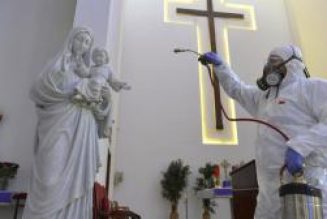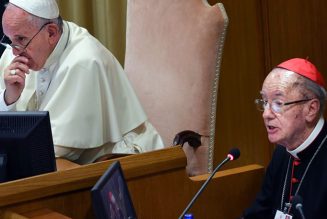, April 15, 2021

After “Divine Mercy Sunday,” think of the Third Sunday of Easter, Year B, as “Trust Jesus Sunday.”
The readings urge us to make a real break from sin — and it is a message badly needed in our time, which has been defined by nominal Christianity, and so many have claimed a Christian identity without changing their lives.
Jesus spends half of the Gospel proving the resurrection and the other half explaining what it means for us.
Jesus gives many extraordinary proofs for the Resurrection to his disciples in the upper room.
First he appeals to their senses, saying “touch me and see,” to show that he has “flesh and bones” and is not a ghost. Next, he appeals to history, showing his pierced hands and feet, to prove that he is the one they saw crucified, and not an imposter. Last, he eats in front of them, in order, says St. Bede, “that they might not suspect that his appearance was … only imaginary.”
The Gospel shows their tumult of emotions as the dead Lord whom they abandoned comes back to confront them. They start out “troubled” as “questions arise in their hearts.” Then they are “incredulous for joy” and, in the end, “amazed.”
It’s then, when they are convinced and their hearts are full, that Jesus tells them what he expects. The first thing he does is exactly what St. Peter does in the First Reading for this Sunday: He shows how the Jewish prophecies lead to him; he “opened their minds to understand the Scriptures;” he shows them how it all led to his passion.
Then he tells them why: “That repentance, for the forgiveness of sins, would be preached in his name to all nations.”
That “repentance” part gets a lot of play this Sunday.
Peter demands it in the first reading — “Repent, therefore, and be converted, that your sins may be wiped away” — and John says it bluntlyin the Second Reading: “My children, I am writing this to you that you may not commit sin.”
Don’t misunderstand. Neither Peter nor John present Jesus as a Pharisaical tyrant demanding perfection. Peter points out that those who did the worst thing imaginable — “put the author of life to death” — did so out of “ignorance.” And John assures us: “If anyone does sin, we have an Advocate with the Father, Jesus Christ, the righteous one,” the expiation “not for our sins only but for those of the whole world.”
John says repentance is necessary to be friends with Christ, because friends are careful not to offend their friends. “The way we may be sure that we know him is to keep his commandments,” he says. “Those who say, ‘I know him,’ but do not keep his commandments are liars and the truth is not in them.”
By that definition, there are a lot of us who are liars and don’t know him.
The Church is still recovering from, and is still hampered by, the rise of nominal Christianity, a decadent stage where many — bishops, priests, religious and laypeople — stopped following Christ but stayed in the Church.
The early Christians saw Jesus Christ as God incarnate whose death terrified and amazed them and involved them all in a deep mystery that they had to spend a lifetime understanding and living out. Their penances were hard, the consequences of their faith were great, and the fruits they bore changed the world.
But we tend to see Jesus Christ as the great figure behind a fine moral system. We spend a lifetime honoring him as much as possible while living as comfortably as possible. Our penances are light, the consequences of our faith are slight, and the fruits we bear don’t even change our own lives that much, let alone the world.
The reason is, we have embraced mercy while rejecting repentance.
Christians have no problem believing in Divine Mercy — in fact, we go to the other extreme. Many of us have lost the sense of sin and fully expect God will not care that all that much about whatever we did that was technically off-limits.
But repentance is another matter. We want God to shrug off our sins; we do not want “a radical reorientation of our whole life, a return, a conversion to God with all our heart, an end of sin, a turning away from evil, with repugnance toward the evil actions we have committed,” which is how the Church defines repentance, adding that “it entails the desire and resolution to change one’s life.”
We want forgiveness, but we don’t want that. But the problem is, we can’t have forgiveness without that.
We have bureaucratized Jesus. We think of his forgiveness like a Bulk Trash Pickup where I select out the junk from my basement I don’t want, leave it on the curb and call the city to pick it up.
Jesus is the friend who says, “Let me pick out what you should get rid of, take it all to the dump for you, then reorganize your garage.” I force a smile and say, “Wow! Thanks for that offer, but I would rather make those decisions myself and I don’t really want to owe you a favor …”
Another way of explaining that is to simply say: “I don’t trust Jesus.”
I don’t trust that my life will be better with him than it is without him. I don’t trust that what he asks me will truly deliver more happiness and fulfillment than my pet sins do. I don’t trust that being intimate with him will be freeing instead of a burden.
Jesus wants to change that. He did it for the first disciples in Sunday’s Gospel by being “made known to them in the breaking of the bread” while “opening their minds to understand the Scriptures.”
He does exactly the same thing for us at Mass, and he gives us even more opportunity to understand the Scriptures — through Father Mike Schmitz, Bishop Robert Barron, Dr. Scott Hahn and so many more.
And he invites us to trust him.
“It is in discovering the greatness of God’s love that our heart is shaken by the horror and weight of sin and begins to fear offending God by sin and being separated from him,” says the Church.
We are thankful for Divine Mercy Sunday last week. Now, we ask Jesus for the courage to accept his friendship and change our hearts on Trust Jesus Sunday.
Tags: prayer, Sunday Gospel, Sunday Readings, Third Sunday of Easter Year B
Never miss a post! Subscribe below to our weekly newsletter.
Related
Join Our Telegram Group : Salvation & Prosperity








